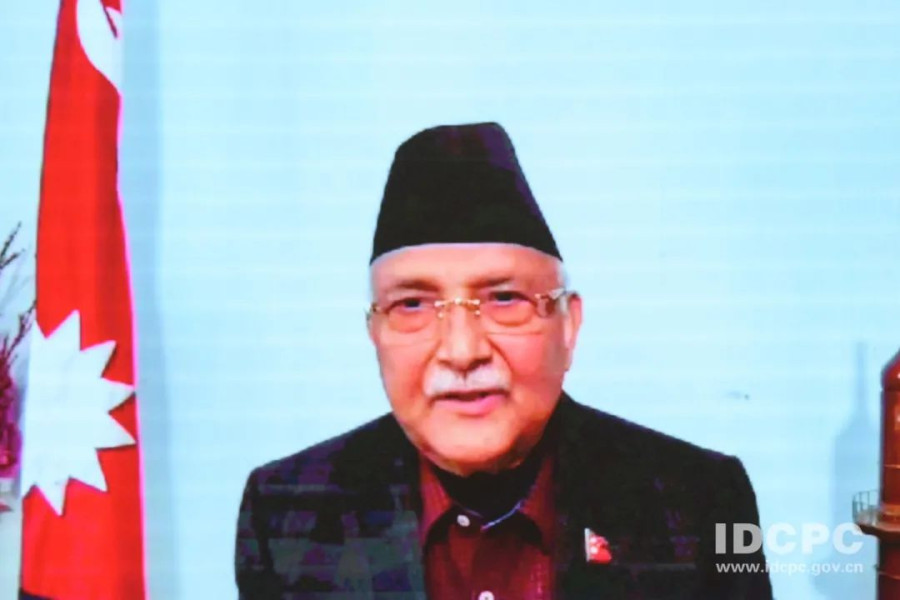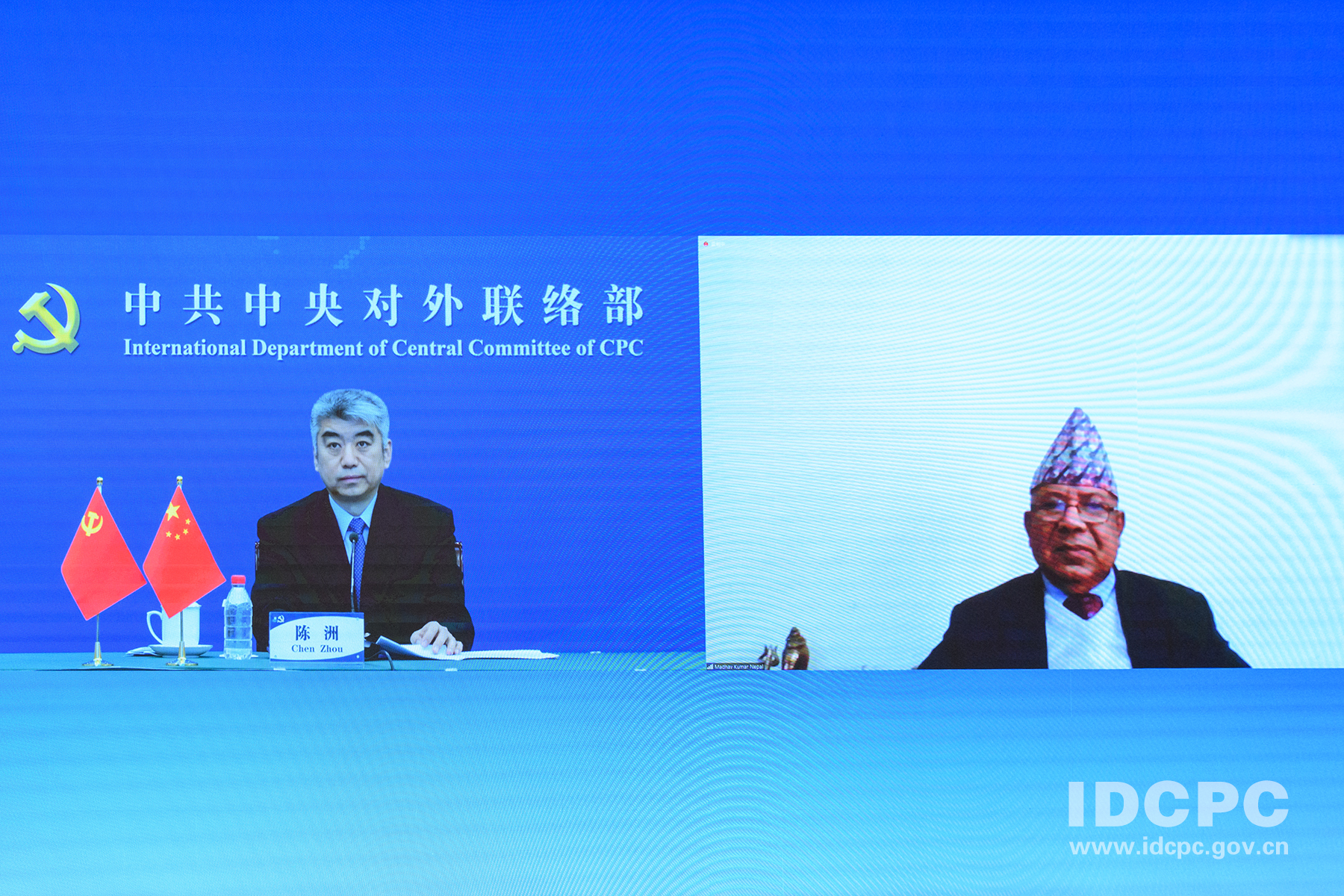National
Amid MCC row in Nepal, Chinese officials speak to Oli and Nepal
Talks take place just as Beijing warns against Washington’s ‘coercive diplomacy’ in Nepal.
Post Report
Song Tao, Minister of the International Liaison Department of the Central Committee of the Communist Party of China, and CPN-UML chair and former Nepal prime minister KP Sharma Oli held a virtual meeting on Wednesday.
According to Xinhua, China’s official news agency, Song held a video call on Wednesday with Communist Party of Nepal (Unified Marxist-Leninist) Chairman and former prime minister Oli to discuss further strengthening bilateral relations between the two parties and enhancing cooperation between China and Nepal in various fields.
While stating that China attaches great importance to strengthening inter-party exchanges with major parties in Nepal such as the CPN-UML, Song said China will, as always, support the Nepali people in their independent choice of development path, firmly safeguard national sovereignty and security interests, and continue to provide support to the best of its ability for Nepal’s economic and social development.
According to the official website of the Chinese Communist Party’s International Department, Oli said that Nepal and China are good neighbours and good brothers.
“For a long time, bilateral relations have been progressing on the basis of mutual respect, equality and mutual benefit. The CPN-UML attaches great importance to strengthening inter-party exchanges with the CPC, and supports each other on issues concerning each other's core interests and major concerns,” said Oli.
The conversation took place as Nepal is caught in a dilemma over whether to ratify through parliament the Millennium Challenge Corporation-Nepal Compact, a $500 million US grant to Nepal to be used in construction of electricity transmission lines and road maintenance.
The Song-Oli talks took place on the same day when Beijing warned against the US’ “coercive diplomacy” in Nepal.
Chinese Foreign Ministry Spokesperson Hua Chunying said on Wednesday that China opposes “coercive diplomacy” and will support the Nepali people to choose their own development path as always.
According to the Global Times, Hua made the remarks responding to the controversy over a US deadline to Nepal to pass the MCC compact through parliament by February 28.
In multiple communications to the Nepali leadership over the past few weeks, Washington has said it wants to see the MCC compact endorsed through parliament by February 28, a deadline requested by Nepali leaders themselves.
On February 9, the US embassy in Kathmandu said the MCC grant is “a gift from the American people and a partnership between the two nations that will bring jobs and infrastructure to Nepal and improve the lives of Nepalis.”
“How could a ‘gift’ be sent by an ultimatum? How could people accept such a ‘gift’?” said Hua on Wednesday at a press conference in Beijing. “Is it a ‘gift’ or a Pandora's box? Is it afraid that just as the old Nepali saying goes, it looks delicious, but it's actually a meat tough to chew.”
This is the second time China has made such a statement over the US insistence on MCC ratification, calling it a “coercive diplomacy.”
On February 18, Wang Wenbin, spokesperson for the Chinese Foreign Ministry, said China opposes coercive diplomacy and actions that pursue selfish agenda at the expense of Nepal’s sovereignty and interests.
“We’ve noted relevant reports. China is glad to see the international community conducting development cooperation with Nepal to contribute to its economic growth and livelihood improvement,” said Wang. “However, such cooperation should be based on full respect for the will of the Nepali people and come with no political strings attached.”
“As Nepal’s friendly close neighbour and development partner, China will, as always, support the Nepali people in choosing their development path independently, support Nepal in making the right choice in keeping with its national interests and people’s will, and continue to provide assistance and support for the country’s socioeconomic development to the best of our capability,” Wang added during a press briefing.

Two days after the Chinese reaction, on February 20, the Ministry of Foreign Affairs issued a statement saying, “Decision to accept development assistance is taken by Nepal in terms of our national interest and priority. The sovereign parliament of Nepal alone decides what development assistance is needed in the best interest of Nepal and Nepali people.”
During his conversation with Oli on Wednesday, Song said that the Communist Party of China attaches great importance to strengthening inter-party exchanges with major parties in Nepal such as the CPN-UML.
According to the CPC, Oli said that Nepalis appreciate China's support for Nepal's independent choice of development path, firmly adheres to the one-China principle, and resolutely opposes any forces using Nepali territory to engage in anti-China activities.
Also on Wednesday, Chen Zhou, vice-minister of the International Department of the CPC Central Committee, held a video call with CPN (Unified Socialist) chair Madhav Nepal.
According to the International Department, Central Committee of the CPC, Chen spoke positively of the relations between the two countries and the two parties.
He said the Chinese side will continue to support the Nepali people on independently choosing a development path.
“The CPC is willing to, together with the Communist Party of Nepal (Unified Socialist), strengthen experience exchange in party governance and state administration, propel cooperation in various areas under the framework of the Belt and Road Initiative, and push for healthy and stable development of bilateral relations,” said Chen, according to the the International Department of the CPC Central Committee.
Nepal said the Nepali side firmly follows the one-China principle, and will by no means allow any forces to carry out anti-China separatist activities in Nepal's territory.
“Nepal looks forward to stepping up cooperation and exchanges with the CPC to make active contributions to promoting Nepal-China friendship,” said Nepal, the former prime minister.
Nepal government is under pressure to ratify the MCC compact as political parties remain sharply divided over the US grant. Amid delays and confusion, US Ambassador Randy Berry has held several rounds of talks with Prime Minister Sher Bahadur Deuba and UML chair Oli over the past few days.




 20.53°C Kathmandu
20.53°C Kathmandu













